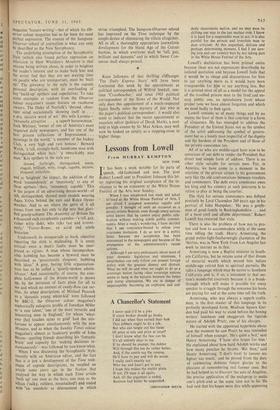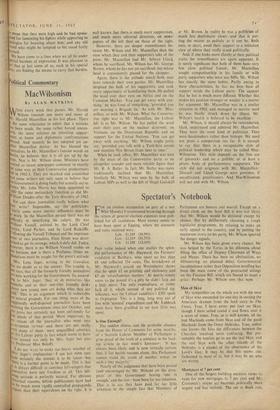Lessons from Lowell
From MURRAY KE.MPTON
NEW YORK
T has been a week notable for its parts of
speech, old-fashioned and new. The poet Robert Lowell sent to President Johnson this let- ter regretting his original acceptance of the in- vitation to be an ornament at the White House Festival of the Arts next Sunday :
When I was telephoned last week and asked teread at the White House Festival of Arts. I am afraid I accepted' somewhat rapidly and greedily. I thought of such an occasion as a purely artistic flourish, even though every serious artist knows that he cannot enjoy public cele- bration without making subtle public commit- ments. After a week's wondering, I have decided that I am conscience-bound to refuse your courteous invitation. I do so now in a public letter because my acceptance has been announced in the newspapers and because of the strangeness of the administration's recent actions.
Although I am very enthusiastic about most of your domestic legislation and intentions, I nevertheless can only follow our present foreign policy with the greatest dismay and distrust. What we will do and what we ought to do as a sovereign 'nation facing other sovereign nations seems to hang in the balance between the better and worse alternatives. We are in danger of imperceptibly becoming an explosive and sud-
dcnly chauvinistic nation, and we may even be drifting our way to the last nuclear ruin. I know it is hard for a responsible man to act; it is also painful for the private and irresolute man to dare criticism. At this anguished, delicate and perhaps determining moment, I feel I am serv- ing You and our country best by not taking part in the White House Festival of the Arts.
Lowell's declination has been printed entire because these are not expressions describable by isolated quotation and because Lowell feels that it would be as cheap and discourteous for him to say anything more as it would have been irresponsible for him to say anything less. But it is printed most of all as a model for the appeal of the troubled private man to the tired and un- easy public one, an epistolatory form whose proper tone we have almost forgotten and which we need badly to find again.
Lowell reminds us of many things and by no means the least of them is that courtesy is a form of eloquence. He has managed to address the President of the United States not as the symbol of the artist addressing the symbol of govern- ment but as a lonely man respectful of the dignity and the burdens of the President and of those of the private conscience too.
All of us who are middle-aged have now to be conscious of our debt to render the President that direct and simple form of address. There is no other style suitable for serious men. For, in America, we have come to a moment in the relations of the private citizen to his government very like the old confrontations between royalists and commoners. The debt every commoner owes his king and his country at such junctures is to refuse to play at being the courtier.
The style for serious commoners was defined precisely by Lord Clarendon 260 years ago in his portrait of John Hampden: 'He was a gentle- man of good family in Buckinghamshire ... and of a most civil and affable deportment.' Robert Lowell has, restored that style.
There is also the problem of how not to pro- test and how to accommodate while at the same time telling the truth. Henry Armstrong, the grand welter-light-featherweight champion of the 'thirties, was in New York from Los Angeles last week to instruct us in that.
Armstrong is now a Baptist minister in South- ern California, but he retains some of that dream of material wealth which moved him before middle-age retired him to spiritual pursuits. He talks a language which may be native to Southern California and is, if so, a testament to that sec- tion's wonderful creativity because it is a break- through which will make it possible for every speaker to struggle through the nonsense his hosts are paying for and at the same time tell the truth.
Armstrong, who was always a superb crafts- man, is the first master of this language in its perfectly developed form. Madison Square Gar- den had paid his way to stand before the boxing writers' luncheon and exaggerate the tigerish nature of Adolph Pruitt, one of his charges.
He started with the appointed hyperbole about how the moment he saw Pruitt he was reminded of himself when younger. 'He's quite a boy,' said
Henry Armstrong. have dire hopes for him.'
He explained about how hard Adolph works and how many punches he throws. 'But then,' said
Henry Armstrong, 'I don't want to lament my fighter too much,' and he passed from the duty of celebrating dubious future glories to the pleasure of remembering real former ones. But he had helped us to discover the uses of Angelese, the precise application of the malaprop to make one's pitch and at the same time not to lie. He had said that his hopes were dire while appearing 43 Mean that they were high and he had apolo- sed for lamenting his fighter while appearing to Poingise for boasting about him; and any old 'end who might be tempted to bet stood fairly irned.
We have come to a time when we all lie under )ceial burdens of expression. It was pleasant to L' that at last some of us, each in his special 1Y, are finding the means to Carry that burden.



































 Previous page
Previous page